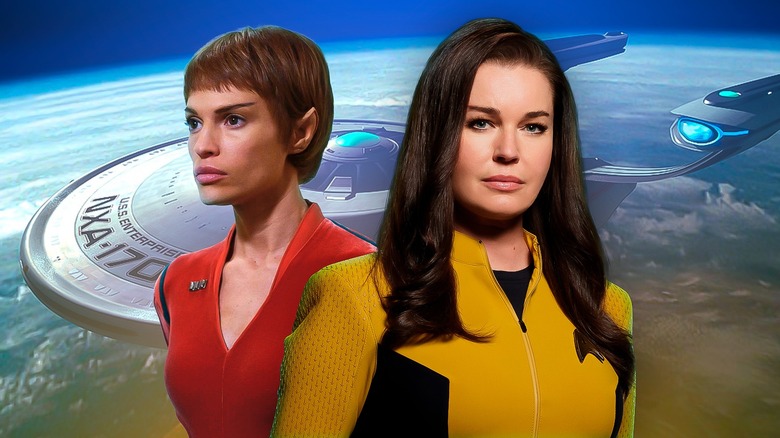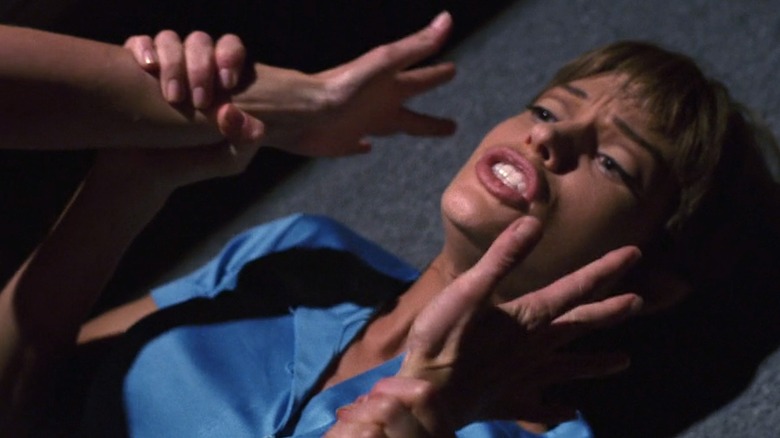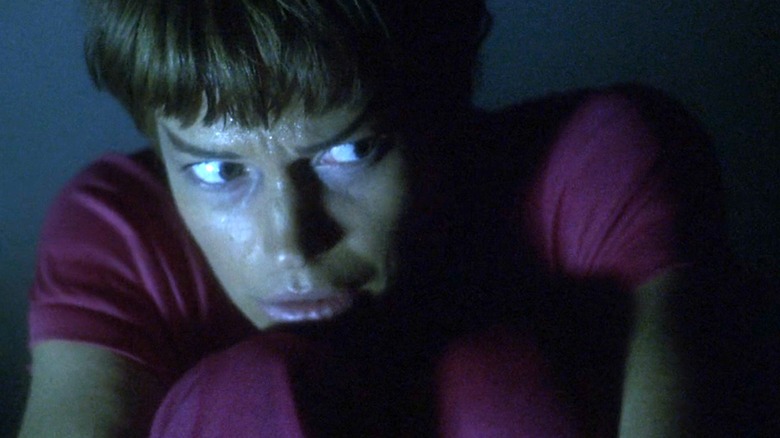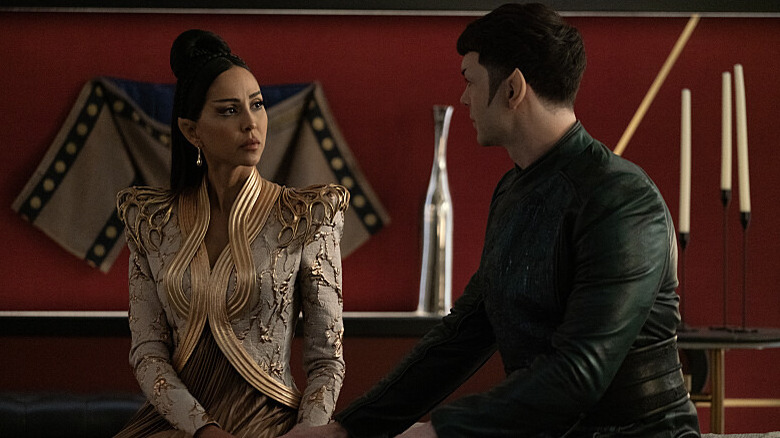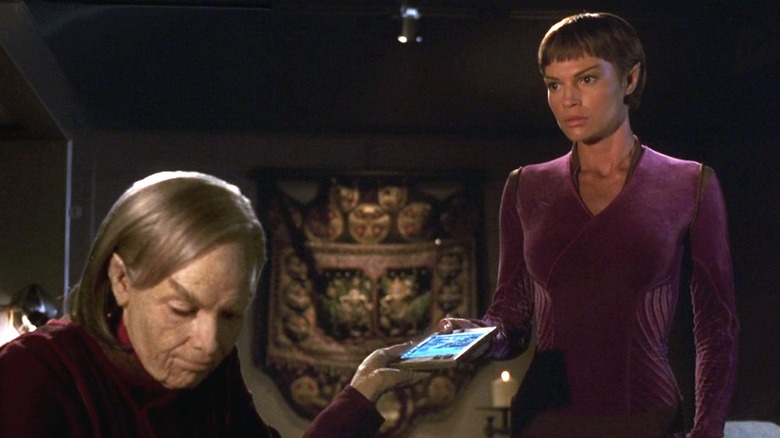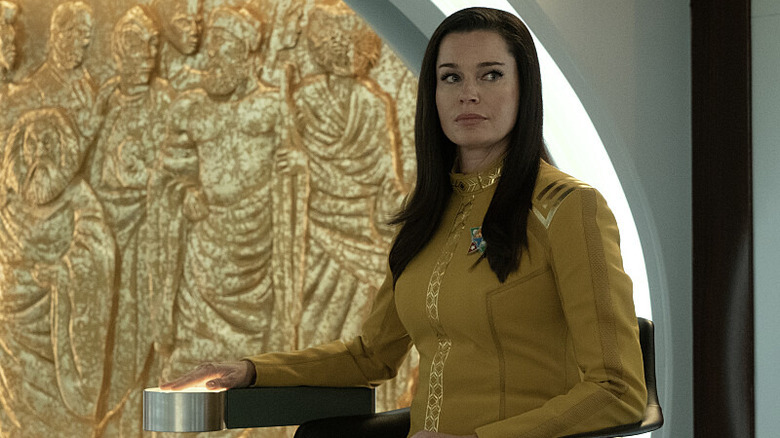Strange New Worlds Season 3 Has To Add T'Pol (& Redeem Star Trek Enterprise)
"Star Trek" may be set in the future, but its small-screen installments have always been as much an unintentional product of their time as they are an intentional commentary on it. This is especially true of the franchise's least-loved series, Rick Berman and Brannon Braga's "Star Trek: Enterprise" — the 2001-2005 prequel to Gene Roddenberry's original "Star Trek." With a post-"Quantum Leap" Scott Bakula in the captain's seat and a fresh era to explore, the series could have been a revolutionary addition to the ongoing narrative. It wasn't.
In documentaries like "The Center Seat: 55 Years of Star Trek" and within countless fan discussions, the series received negative attention due to its inconsistent writing and inability to live up to its predecessors. Occasionally, the show's premise is held up as the reason for its failure, and in fairness, a lot of this does account for some of the issues with "Enterprise." But none of it accounts for the series' abysmal treatment of Jolene Blalock's T'Pol — the franchise's first female Vulcan bridge officer. For a series set in the mid-22nd century, its unabashed, enthusiastic objectification of Blalock — coupled with its misunderstanding of T'Pol and underutilization of her Vulcan mind — places "Enterprise" firmly in what Vox's Constance Grady calls "The bubblegum misogyny of 2000s pop culture."
Despite this, Blalock instilled her character with far more dignity than her scant lines had. With the help of "Strange New Worlds" (currently, and fittingly, the franchise's most-loved series), T'Pol might finally get a chance to shine.
Enterprise exploited and abused its Vulcan...
We could give you a laundry list of every time "Enterprise" found cheap excuses to slip Blalock into — or out of — half-buttoned satin P.J.s, skimpy crop tops, and lower-than-low-rise flares, but there's no point. Yes, T'Pol's outfits are eye-roll-worthy, but her storylines are downright abusive. T'Pol is not so much a character as she is a lightning rod for trauma.
T'Pol is sexually assaulted — albeit metaphorically speaking — twice in the series' short run: in Season 1's "Fusion," and Season 3's "Rajiin." However, the violations don't stop there. As for consensual, voluntary sexual encounters — or T'Pol having any semblance of sexual agency — forget it. T'Pol's pseudo relationship with Connor Trinneer's Tripp begins when Dr. Phlox (John Billingsley) insists she give Tripp "Vulcan neuro-pressure" — a translucently veiled metaphor for a sexual massage — to help him sleep. In Season 2's "Bounty" — in a sub-plot that appears to have been written by Glenn Quagmire — Phlox must nobly fend off T'Pol's aggressive sexual advances after a microbe causes her to go into Pon farr. Canonically, Pon farr requires that a Vulcan return to their home planet to mate, but this is conveniently not so for T'Pol. She simply needs to have sex with a male or she'll die. Again, she's denied access to and control over her sexuality.
All this could be forgotten (though not forgiven) if the writing gave us a three-dimensional Vulcan woman. Blalock failed and she knew it. As she told SFX in 2004, "You can't take T'Pol and say 'Okay, you're a Vulcan' and take away the Vulcan characteristics" (via Trek Today). But that's exactly what "Enterprise" did.
If you or anyone you know has been a victim of sexual assault, help is available. Visit the Rape, Abuse & Incest National Network website or contact RAINN's National Helpline at 1-800-656-HOPE (4673).
...and turned her into an hysterical woman trope
For all its equally frustrating objectification of Seven of Nine (Jeri Ryan), "Star Trek: Voyager" still imbued the former Borg with the calculating logic and robotic groupthink of her former species. Her motivations and rationale worked! T'Pol, on the other hand, seemed to confuse her creators — as in, a highly logical woman? Is that...a thing?
"Enterprise" never treated T'Pol like a Vulcan. Instead, she was more like a female version of Brent Spiner's Data – trapped perpetually in an episode where his emotion chip has gone haywire (but with a fraction of the knowledge). The series repeatedly positioned emotion as something T'Pol had no understanding or experience to navigate. This isn't how Vulcans operate. They feel emotion and impulse but have evolved to suppress these things ... That's their whole thing! The ability to suppress emotions relies on one's skill at understanding emotions. And yet, while the series showed T'Pol using Vulcan methods to suppress emotion, it frequently implied that she — like any stock hysterical woman — couldn't understand her emotions, much less manage them.
In giving us a Vulcan who was more "undone" by emotion than torn about whether or not total suppression is the right way to live, "Enterprise" misrepresents one of the most compelling themes in the "Star Trek" narrative — the Vulcan-versus-human, logic-versus-feeling conflict that exists to remind us that in an ideal world, emotion needn't rob us of reason, and vice versa.
An untapped plot from Enterprise could hold the key to T'Pol
Unlike "Enterprise," "Strange New Worlds" has done an incredible job exploring the limits of logic and emotions by showing us that leaning too far to one side or the other ultimately has the same result: It impedes empathy. Spock has always been a great character to illustrate this, but as he's half human, he's essentially the struggle incarnate rather than a Vulcan navigating it.
In "Strange New Worlds," Gia Sandhu's T'Pring depicts what it takes to live rationally in an illogical world. If you're thinking T'Pring's existence makes T'Pol's return redundant, think again! While T'Pring has finally provided the franchise with a full-blooded Vulcan woman who's also a central character, we've yet to see what happens when Vulcans mate with a species to whom they're far more closely related than humans: Romulans.
As it turns out, T'Pol is what happens (or rather, what should have happened). In a 2010 interview with StarTrek.com, "Enterprise" writer Mike Sussman revealed that had the series not been canceled, it might have redeemed itself (partially) by giving us some explanation for T'Pol's suspiciously un-Vulcan inconsistencies. "I had this sneaky plan to reveal that T'Pol's father was a Romulan," he said. "I think I could've sold Rick and Brannon on it." Forget selling Rick and Brannon! It's 2024 and they don't go here anymore, but their Vulcan First Officer could, and her re-matriculation fits not just thematically but chronologically and (yep) logically as well.
T'Pol's return would be highly logical
Of course, "Strange New Worlds" doesn't necessarily need the timeline to make sense to bring T'Pol back into the fold, since writers have things like black holes, parallel universes, and the relativity-of-time-and-space thing ... but it helps. From a chronological standpoint, T'Pol's presence on Captain Pike's (Anson Mount) Enterprise makes perfect sense. In the Star Trek timeline, "Strange New Worlds" takes place around 98 years after "Enterprise," which covers 2151 to 2161. At the start of "Enterprise," T'Pol is 63 years into a 200-year lifespan. While she'd be a bit older in "Strange New Worlds," we can safely assume she still has decades to live and time to impact the fledgling Federation and those around her — especially Spock.
Season 5 of "Star Trek: The Next Generation" and Season 4 of "Star Trek: Discovery" follow Spock's tireless fight to reunite the Vulcan and Romulan races — a fight that, centuries after his death, finally leads to Reunification. Is there a better catalyst for Spock's initial foray into empathizing with the Romulans than having him meet an older, wiser, and conveniently half-Romulan T'Pol? This idea was precisely what Sussman had in mind too. In 2016, the writer shared an old memo from "Enterprise" on X, formerly known as Twitter, suggesting a story where young Spock aids an older T'Pol on an important mission. "In the process, Spock could learn some lesson which helped him choose his own path in life," he wrote.
...and perfectly embody Ad astra per aspera
But would T'Pol's return, nearly two decades later, really redeem the sexist starship wreck that was "Enterprise"?
With a franchise like "Star Trek," that's not the right question. In "Strange New Worlds" Season 2, Episode 2, Rebecca Romijn's Commander Una Chin-Riley makes an emotional plea during her court-martial. "Starfleet is not a perfect organization," she says. "...But it strives to be. And I believe it could be."
Star Trek is not a perfect franchise. But it strives to be. With each new era's installments, the characters, storylines, themes, conflicts, and conclusions bring us one step closer to fully realizing a dream that began in 1966 — just two years after the Civil Rights Act was passed, and less than a year before the "Long, Hot Summer" of 1967. Rodenberry's series didn't live up to its ideals of equality, inclusivity, and acceptance because the society that produced it had yet to live up to them. In 2001, society still had yet to, and 60 years from now, the world will undoubtedly look back on "Strange New Worlds" and think that it too didn't adequately live up to the series' ideals because the society that produced it (that'd be us) also had — and currently has — yet to.
While we may have a long way to go, we've come a long way since 2001. And though T'Pol's return won't undo what was, it will bring the franchise, its audience, and the character Blalock fought to create one step closer to what they could be.
